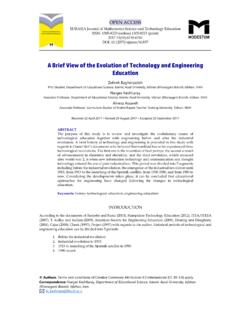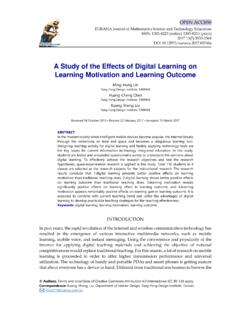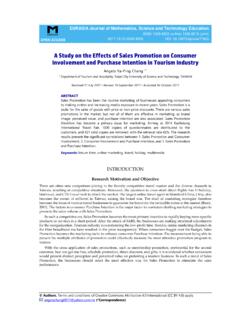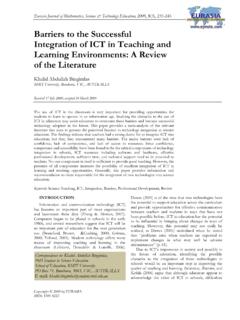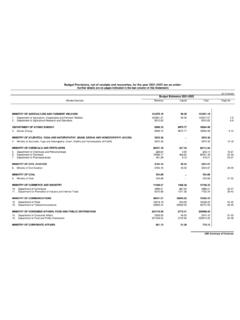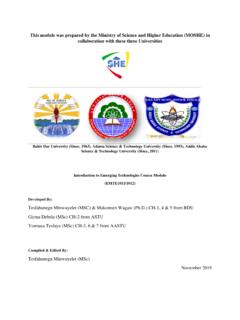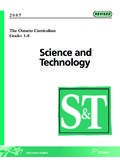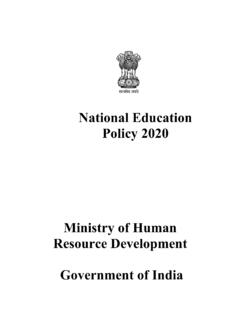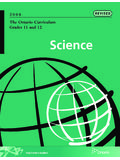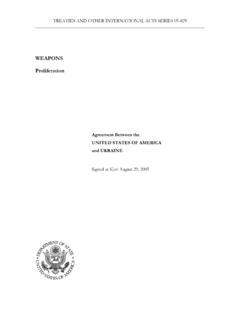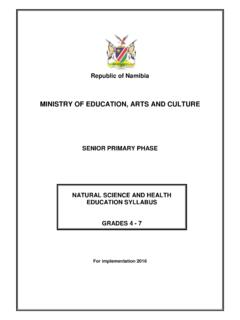Transcription of Effect of COVID-19 on the Performance ... - Science education
1 EURASIA Journal of Mathematics, Science and technology education , 2020, 16(7), em1851 ISSN:1305-8223 (online) OPEN ACCESS Research Paper 2020 by the authors; licensee Modestum LTD. This article is an open access article distributed under the terms and conditions of the Creative Commons Attribution License ( ). (*Correspondence) Effect of COVID-19 on the Performance of Grade 12 Students: Implications for STEM education Edgar John Sintema 1* 1 PhD Candidate, School of Doctoral Studies, Universidad de Valladolid, SPAIN Received 13 March 2020 Accepted 6 April 2020 Abstract With all learning institutions pre-maturely closed on 20 March 2020 and all citizens advised to self-isolate in a bid to control the spread of COVID-19 , it was hypothesized that COVID-19 would negatively impact on the Performance of students in the 2020 Grade 12 national examinations vis- -vis mathematics, Science and design and technology subjects.
2 An observed steady increase in the number of COVID-19 confirmed cases and the low levels of technology use in secondary schools in Zambia due to limited technology resources signifies a very difficult period in a young country which has just rolled out a nation-wide implementation of STEM education , This study collected data from three teachers at a public secondary school in Chipata District of Eastern Province in the Republic of Zambia. The Head of Department for Mathematics, the Head of Natural sciences Department and one Science teacher were interviewed. Semi-structured interviews via mobile phone were used to collect views of what these specialists thought would be the COVID-19 effects on the general Performance of students in their subject areas. Results of this study revealed that there is likely to be a drop in the pass percentage of secondary school students in this year s national examinations if the COVID-19 epidemic is not contained in the shortest possible time considering that the school academic calendar was abruptly disturbed by the early untimely closure of all schools in the country.
3 Keywords: COVID-19 , STEM subjects, mathematics education , Zambia INTRODUCTION Around mid-March 2020, the Zambian government through the Minister of Health announced at a press briefing that all schools, colleges and universities would close indefinitely on Friday, 20 March 2020 amid fears of the Coronavirus ( COVID-19 ) outbreak that had reportedly ravaged most parts of China, United States of America, Italy, Spain and other parts of Europe and Africa. This meant that secondary school students in most public and private schools ended Term 1 of the academic year 2020 without sitting for their end-of-term tests as many public and private schools administer assessment tests at the end of each of the three terms of the academic year. About COVID-19 There is currently little or no literature on COVID-19 in relation to educational studies. The only literature available is directly related to medical studies (Chinazzi et al., 2020; Hopman, Allegranzi, & Mehtar, 2020; Kraemer et al.)
4 , 2020; Wu & McGoogan, 2020; Zu et al., 2020). This is not because education is not directly affected by the Effect of the COVID-19 epidemic but rather because studies in education rarely incorporate effects of disease on the effective provision of education to learners across the globe. The rate at which COVID-19 has rapidly been spreading has made every sector of human life to immediately feel its impact. Medics are in the laboratories trying to find a medical solution to this epidemic. Economists are working on ways of managing the economic Effect of this epidemic on country economies because businesses are closing down every day and there are restrictions on human mobility within and across boarders (Kraemer et al., 2020). A disease which appeared in the Chinese region of Wuhan surprisingly spread so fast across China and other parts of the world (Wickramasinghe et al., 2020). Sintema / Effect of COVID-19 on the Performance of Grade 12 Students 2 / 6 With news of increased number of cases of COVID-19 around the world it was legitimately reasonable for the government of Zambia to start worrying and putting measures in place that would prevent any form of COVID-19 outbreak in the country.
5 Sadly, at the time of writing this paper the ministry of Health in Zambia had announced the death of one COVID-19 victim out of the reported 39 cases. This justifies government abrupt closure of all schools on 20th March 2020. The government of Zambia has so far managed to contain the spread of COVID-19 with timely intervention measures that included restricted inflow of flights from outside, countrywide sensitization programs and daily updates by ministry of Health officials. In fact, on 2 April 2020 Zambia had not recorded any new case of COVID-19 . COVID-19 and STEM education in Zambia The untimely closure of secondary schools was a positive response by government to protect school going children from possible risks of contracting COVID-19 because school environments are places where hundreds of students meet, and this makes them dangerous places where disease can rapidly spread. Many low- and middle-income countries have lamented the devastating economic effects that will come with COVID-19 as many economic drivers will be run down.
6 However, little or nothing has been said about COVID-19 effects on education , particularly its effects on the Performance of secondary school students who will be sitting for the national examinations in November 2020 and General Certificate Examination ( ) candidates who will write their examinations in August 2020. Thus, the purpose of this study was to report on the views of teachers of mathematics and Science on the likely effects of COVID-19 on STEM education vis- -vis Performance of students in STEM subjects. This study is therefore important in that it provides information to the ministry of education to step up its preparedness to contain effects of COVID-19 on the education systems. It is also crucial because the results could be used by educationists in other contexts in their plans to prepare for combarting effects of the epidemic on their own education systems. The study is also significant to educational research as it contributes valid and important literature to the field of mathematics education that researchers could use to support future studies related to COVID-19 and education in general.
7 Zambia operates a trimester education system for all secondary schools. In this system students in examination classes like Grades 9 and 12 have about 13 weeks of learning each term. However, planned and unplanned activities usually make it impossible for these students to have a smooth academic year purely dedicated to learning and preparing for examinations which come in November of each year. Planned activities that affect the school calendar include sporting activities like athletics which usually come in term one and ball games which come in term two. Unplanned events include health related occurrences like COVID-19 that force government to close schools in order to save life. In the two cases that would affect the school calendar it is the unplanned events that have a far-reaching damaging Effect . In the current situation the outbreak of COVID-19 forced the government of Zambia to close all schools and encouraged all citizens to self-isolate to curb the spread of the epidemic.
8 This closure meant school going children losing close to three weeks of learning time in term one of 2020 with the re-opening date not known. Thus, the impact of this epidemic will strongly be felt by General Certificate Examination ( ) candidates whose examinations are usually written in July/August of each year. Their preparation for examinations has been adversely affected by the country wide self-isolation. Similarly, Grade 12 students who will be writing their final examinations in November have also been negatively affected by the loss of contact hours especially that the country does not have a well-developed e-learning platform (Phiri & Sintema, 2018) for schools that can cushion the loss of learning time. In the third term of the academic year 2020 teachers will be panicking trying to cover the syllabus. As a result, STEM subjects will suffer the most because the country is already struggling to improve Performance in these subjects.
9 For Zambia which has been recording low pass rates in STEM subjects (Mathematics, Science , Design & technology ), the effects of COVID-19 will most likely affect the rollout of the STEM curriculum which started early 2020 and the overall Performance rates in Mathematics, Science and Design & technology subjects. Contribution to the literature Research study investigated potential effects of COVID-19 on STEM education in Zambia. The study highlights the Zambian government response to COVID-19 by closing schools as an intervention measure to protect school children from the risk of contracting and spreading COVID-19 . The study highlights how COVID-19 is likely to affect national examination results for the 2020 academic year. The study proposes suggestions for catching up on lost time in the academic calendar. EURASIA J Math Sci and Tech Ed 3 / 6 Data collected from one public school in Chipata District shows that the pass rate of at Grade 12 level in national examinations has been on a steady increase, a situation which is pleasing.
10 A look at the examinations results for the 2018 and 2019 academic years shows improvement in STEM subjects Performance (Table 1). Computer Science and mathematics recorded significant improvements in Performance levels with % and rise in pass rate respectively while pure chemistry and design and technology maintained a 100% pass rate over a two-year period. However, Science recorded a small percentage drop in Performance with pure physics posting quite a significant drop. With the school putting in measures to maintain the maximum pass rate in Design & technology and pure chemistry, and interventions to induce a rise in other subjects, COVID-19 has emerged to be an obstacle and raises fears that the school may experience a drop in overall Performance this academic year. METHODOLOGY This study employed a qualitative design (Creswell, 2017) using a case study approach. Three cases were studied throughout this study whose views are presented in the results section.
